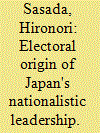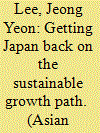| Srl | Item |
| 1 |
ID:
094416


|
|
|
|
|
| Publication |
2010.
|
| Summary/Abstract |
In recent years, some Japanese prime ministers have exhibited a nationalistic tendency, particularly in their foreign policies. The increasing nationalistic appeal by recent leaders marks a sharp contrast with previous leaders, who were unwilling to cause friction with other countries and thus took more centrist positions. More interestingly, those recent leaders, including Koizumi Junichiro, previously adopted a more modest stance. This article seeks to explain the increase in nationalistic appeal, particularly between 2001 and 2006, among Japanese leaders by focusing on some important changes in the Liberal Democratic Party's (LDP's) presidential election procedures. Drawing on the study of US primary elections, I argue that the increase in the weight of rank-and-filers' votes vis-à-vis the LDP Diet members' votes in the LDP presidential election encouraged some candidates to take more ideologically extreme positions. In other words, much like US primaries, the LDP presidential elections can have a tendency to pull some candidates toward extreme positions.
|
|
|
|
|
|
|
|
|
|
|
|
|
|
|
|
| 2 |
ID:
084397


|
|
|
|
|
| Publication |
2008.
|
| Summary/Abstract |
The orthodox view or 'rule' of Japanese politics over past decades has been that Japanese leadership is weak and reactive. As such, Koizumi Jun'ichir?, a recent Japanese prime minister, is seen as a great exception to this rule. This article seeks to re-evaluate this orthodoxy in light of wider leadership theory and recent studies on Japanese political leadership. Focusing especially on how assessments of Koizumi's leadership compare to those of previous leaders, it looks at how the literature on Japanese politics has viewed both Japan's political environment and its political leaders. It argues that Koizumi interacted with, not merely reacted to, his political environment. At the same time, he employed a leadership style which, although distinctive, shared important similarities with previous leaders. Accordingly, he was less an exception to this rule than a confirmation of the historical diversity of Japanese political leadership.
|
|
|
|
|
|
|
|
|
|
|
|
|
|
|
|
| 3 |
ID:
098175


|
|
|
| 4 |
ID:
140697


|
|
|
|
|
| Summary/Abstract |
examine the Koizumi Junichiro era in Japan to derive lessons for the current Abe Shinzo administration that vows to get Japan back on the path of sustainable growth. Standard growth theory identifies total factor productivity (TFP) as the key to sustainable growth. The existing empirical evidence clearly indicates that economic recovery during Koizumi's tenure was accompanied by robust growth of TFP. To account for this improvement in TFP performance, I focus on three developments during Koizumi's term: promotion of competition by introducing market discipline to various sectors of the economy, effectiveness of market entry and exit, and use of foreign competitive pressure to enhance domestic efficiency.
|
|
|
|
|
|
|
|
|
|
|
|
|
|
|
|